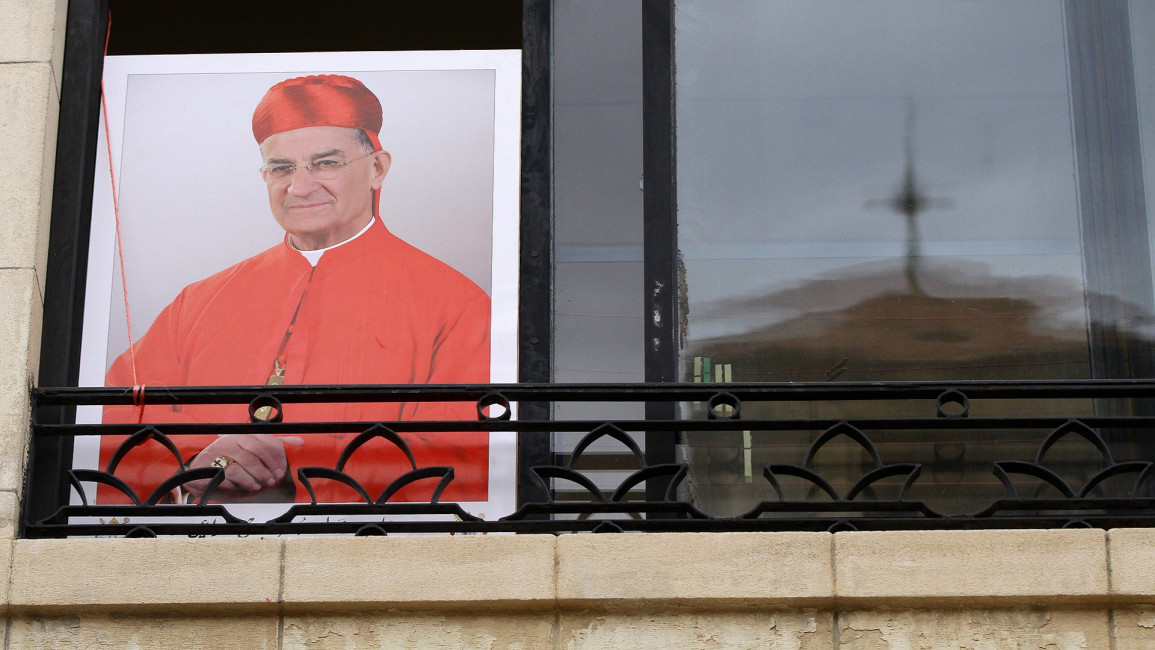
Critics round on Lebanese Catholic Cardinal over Syria visit
Critics round on Lebanese Catholic Cardinal over Syria visit
Critics rounded on the Patriarch of the powerful Lebanese Maronite after he visited Latakia and Tartus in Syria, saying such visits legitimised the Assad's regime.
3 min read
Carindal al-Rai feels he must defend his declining Christian community in Lebanon and beyond [AFP]
Cardinal Bechara Boutros Rai, the Patriarch of the powerful Lebanese Maronite Catholic Church, earlier this week made a two-day visit to Tartous and Latakia, cities that are considered strongholds of support for the Syrian President Bashar al-Assad.
This is not the first time the cardinal has visited Syria during the nearly five-year conflict there.
As the Maronite Patriarch of "Antioch and all the east," an area that purportedly includes regions expanding from Turkey to Mauritania, and Saudi Arabia to Iran, Rai has often said he cannot exclude anyone from his religious visits.
This was the same logic he used when he visited Israel last year, setting a precedent since at least 1948, the year the Zionist state was created on occupied Palestinian land.
"I am going there to say this is our city," the cardinal said at the time, in reference to Jerusalem. "I am going home, and I am going to see my people. We have been present in Haifa and Galilee long before Israel."
Controversially, Rai met there with Maronites who fought for Israel during the 22-year occupation of southern Lebanon, militiamen who had sought refuge in Israel in 2000 and are still wanted in Beirut.
Rai's four-year tenure at the head of the Maronite Church has been marred by similar controversies.
When he took over at the height of the Arab Spring, Rai infuriated opponents of the Syrian regime by supporting Hizballah's right to bear arms, and warning of an Islamist takeover of Syria if Bashar al-Assad is overthrown.
The cardinal, unlike his predecessor Nasrallah Boutros Sfeir, adopted a more concilatory tone towards the Syrian regime, a historical foe of many Maronite political parties in the country.
On social media, some have censured the Christian cleric, especially after a picture emerged purportedly showing him behind a podium adorned with a portrait of Bashar al-Assad.
"Im sorry but this is a very bad picture for Bechara Boutros al-Rahi, he should be standing on Bashars face and not sitting behind it [Sic]," wrote Omar Shibly.
But while critics say Rai's visits to Syria and Israel legitimise their regimes, others see his actions as necessary to preserve an endangered community in a turbulent region.
Simply put, Rai cannot afford to alienate anyone, especially as tens thousands of Maronite Christians live in Syria, the birthplace of the church's founder St. Maron.
This is not least because the Maronite community in Lebanon itself has been greatly weakened over the decades, as its numbers dwindle and its political power is eroded by the more numerous Sunni and Shia Muslims in Lebanon.
This is not the first time the cardinal has visited Syria during the nearly five-year conflict there.
As the Maronite Patriarch of "Antioch and all the east," an area that purportedly includes regions expanding from Turkey to Mauritania, and Saudi Arabia to Iran, Rai has often said he cannot exclude anyone from his religious visits.
This was the same logic he used when he visited Israel last year, setting a precedent since at least 1948, the year the Zionist state was created on occupied Palestinian land.
"I am going there to say this is our city," the cardinal said at the time, in reference to Jerusalem. "I am going home, and I am going to see my people. We have been present in Haifa and Galilee long before Israel."
Controversially, Rai met there with Maronites who fought for Israel during the 22-year occupation of southern Lebanon, militiamen who had sought refuge in Israel in 2000 and are still wanted in Beirut.
Rai's four-year tenure at the head of the Maronite Church has been marred by similar controversies.
|
|
When he took over at the height of the Arab Spring, Rai infuriated opponents of the Syrian regime by supporting Hizballah's right to bear arms, and warning of an Islamist takeover of Syria if Bashar al-Assad is overthrown.
The cardinal, unlike his predecessor Nasrallah Boutros Sfeir, adopted a more concilatory tone towards the Syrian regime, a historical foe of many Maronite political parties in the country.
|
On social media, some have censured the Christian cleric, especially after a picture emerged purportedly showing him behind a podium adorned with a portrait of Bashar al-Assad.
"Im sorry but this is a very bad picture for Bechara Boutros al-Rahi, he should be standing on Bashars face and not sitting behind it [Sic]," wrote Omar Shibly.
But while critics say Rai's visits to Syria and Israel legitimise their regimes, others see his actions as necessary to preserve an endangered community in a turbulent region.
Simply put, Rai cannot afford to alienate anyone, especially as tens thousands of Maronite Christians live in Syria, the birthplace of the church's founder St. Maron.
This is not least because the Maronite community in Lebanon itself has been greatly weakened over the decades, as its numbers dwindle and its political power is eroded by the more numerous Sunni and Shia Muslims in Lebanon.




